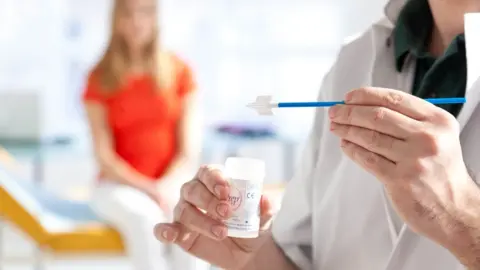Cervical smear tests: 'Concerning' delays on results letters
 Science Photo Library
Science Photo LibraryAlmost half of women in England screened for cervical cancer are waiting more than the two-week target for their results.
NHS England said based on its latest data, 54% of women screened are getting their results on time.
Delays are being blamed on cytology labs struggling to keep staff as the screening process is replaced with another - which will need fewer staff.
A cervical cancer charity said waiting for results is "an anxious time".
Robert Music, chief executive of Jo's Cervical Cancer Trust, said it was "concerning".
"This [the wait] may cause additional stress and potentially result in delays in treatment commencing for those needing it," he said.
Information supplied by NHS England to BBC Coventry & Warwickshire said the process measure is that at least 98% of screening results letters should be received within two weeks.
It also said based on the latest data available, 20% of CCG areas are meeting that standard and that 54% of women screened receive their results within two weeks. The longest recorded wait for a woman to receive the results from her cervical screen is 59 days, it said.

Changes to cervical smear test explained
- Cytology is currently the first test performed on all screening samples but will be replaced by Human Papillomavirus testing
- This new test brings added benefits for women and will prevent more cases of cervical cancer.
- Once implemented, the requirement for cytology will be considerably reduced.
Source: NHS England

Jess Phillips, Labour MP for Birmingham Yardley, had to be regularly tested after her smear test showed up pre-cancerous cells. She was pregnant at the time and could not be treated until after giving birth.
 PA
PAAfter that, she was tested every six months and then annually.
She said delays in waiting for her results would make her fear the worst.
"I always, and there is no rationale behind this, but I always thought the worst when my results have not come in and I would pester my GP and no doubt cause them trouble," she said.
Experiences like hers are not uncommon, she said, and it is an incredibly stressful time when waiting for results.
"I think this (the delays) could have been foreseen and things could have been put in place for a transition period," she said.
'Anxiety'
Dr Suzy Lishman, president of the Royal College of Pathologists, said although less than 50% of women were not getting their results within two weeks, 83% were getting theirs within three weeks.
"The effect is mainly anxiety but it is very unlikely to have an effect on their health as cervical cancer can take decades to develop."
Figures issued by NHS Digital for the year 2015-16 showed 89.1% of women across England got their results letters within the two weeks.
An NHS England spokesperson said cervical screening turnaround times are closely monitored.
"A way of analysing tests which will identify more women who are at risk and save more lives is being introduced. However, the transition is impacting on turnaround times as new system is implemented.
"This will be completed in 2019 and in the meantime NHS England is working with hospitals to increase capacity and cut backlogs."
 Science Photo Library
Science Photo LibraryJohn Crossley, the deputy chief examiner in cytology, said uncertainty leading to the changes in testing had been a difficult period.
Labs were unwilling to train staff in the current screening process when it was going to be replaced with a different process, HPV screening.
"It's been a balancing act and the scales are starting to tip, he said.
Mr Music said HPV primary screening had been shown to be a more effective test.
"However while the change from cytology to HPV testing as the primary screening method will inevitably mean changes to the workforce, we must not let this impact turnaround times for tests or let the situation get worse," he said.
Mitigation plans, where larger labs help out the smaller ones, have been put in place which Mr Crossley said was the best Public Health England could do.
"I understand the psychological effects of waiting for results, the anxiety it can cause," he said, "but patient care is not being affected."
Reporting team: Susie Rack, Jo Tidman, Shelley Phelps
